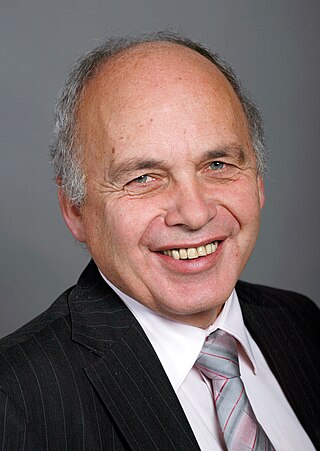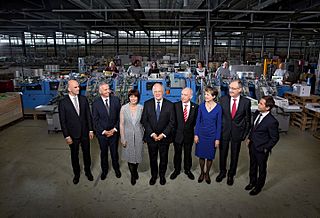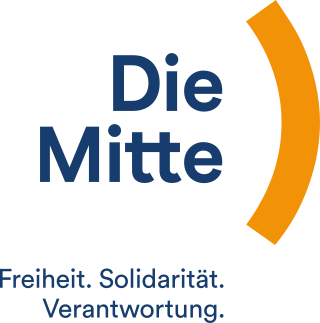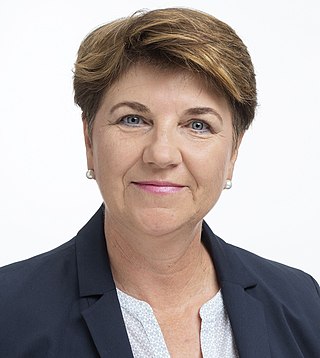
The government of Switzerland is a federal state with direct democracy.

The Federal Council is the federal cabinet of the Swiss Confederation. Its seven members also serve as the collective head of state and government of Switzerland. Since after World War II, the Federal Council is by convention a permanent grand coalition government composed of representatives of the country's major parties and language regions.

The Christian Democratic People's Party of Switzerland, also called the Christian Democratic Party, Democratic People's Party and Swiss Christian Democratic Party, was a Christian democratic political party in Switzerland. On 1 January 2021, it merged with the Conservative Democratic Party of Switzerland (BDP/PBD) to form The Centre, which now operates at the federal level. The Christian Democratic People's Party will continue to exist at the cantonal level as individual local and regional parties determine their status. Its 28 seats in the National Council and 13 seats in the Council of States were transferred to the new party, as was its sole seat on the Federal Council, held by Viola Amherd.

Elections to the Swiss Federal Assembly, the federal parliament of Switzerland, were held on Sunday, 21 October 2007. In a few cantons, a second round of the elections to the Council of States was held on 11 November, 18 November, and 25 November 2007. For the 48th legislative term of the federal parliament (2007–2011), voters in 26 cantons elected all 200 members of the National Council as well as 43 out of 46 members of the Council of States. The other three members of the Council of States for that term of service were elected at an earlier date.

In Swiss politics, the magic formula is an arithmetic formula for dividing the seven executive seats on the Federal Council among the four coalition parties. The formula was first applied in 1959. It gave the Free Democratic Party, the Catholic Conservative Party and the Social Democratic Party two seats each, while the Party of Farmers, Traders and Independents received one seat.
On December 12, 2007, all seven members of the Federal Council, the government of Switzerland, were elected by the joint chambers of the Federal Assembly for the 2008–2012 term of office. Councillors are elected individually by an absolute majority of votes, with the incumbent councillors defending their seats in descending order of seniority.

Eveline Widmer-Schlumpf is a Swiss politician and lawyer who served as a Member of the Swiss Federal Council from 2008 to 2015. A member of the Swiss People's Party (SVP/UDC) until 2008, she was then a member of the splinter Conservative Democratic Party (BDP/PBD) until 2021, when that party merged into The Centre. Widmer-Schlumpf was the head of the Federal Department of Justice and Police from 2008 to 2010, when she became head of the Federal Department of Finance. She served as President of the Swiss Confederation in 2012.

The Conservative Democratic Party of Switzerland was a conservative political party in Switzerland from 2008 to 2020. After the 2019 federal election, the BDP had three members in the National Council.

On 10 December 2008, the Swiss Federal Assembly elected Ueli Maurer as successor to Federal Councillor Samuel Schmid. Schmid resigned on 12 November 2008 after a number of controversies, officially citing health and personal reasons. Maurer took office on 1 January 2009.
A by-election to the Swiss Federal Council was held in Switzerland on 16 September 2009, after incumbent Federal Councillor Pascal Couchepin announced his intention to retire on 31 October 2009.
Two by-elections to the Swiss Federal Council were held in Switzerland on 22 September 2010, after federal councillors Moritz Leuenberger (SP) and Hans-Rudolf Merz announced they would step down from the Federal Council towards the end of the year. The by-elections resulted in the elections of Simonetta Sommaruga from the SP and Johann Schneider-Ammann from the FDP, resulting in no change in the partisan composition of the council. It also resulted in the first majority of women on the Federal Council in its history, with Sommaruga joining Micheline Calmy-Rey, Doris Leuthard and Eveline Widmer-Schlumpf.
An election for all seven members of the Federal Council, the government of Switzerland, was held on 14 December 2011, following the federal election on 23 October 2011. Micheline Calmy-Rey announced she would not run for re-election to the council. According to a traditional informal convention, the successor has to come from the French-speaking or Italian-speaking part of Switzerland. The candidates for her post announced by their respective cantonal sections are Alain Berset (Fribourg), Pierre-Yves Maillard (Vaud), Stéphane Rossini (Valais), and Marina Carobbio (Ticino).

An election for all seven members of the Federal Council, the Government of Switzerland, was held on 9 December 2015, following the federal election on 19 October 2015, for the 2016–2020 term.

Viola Patricia Amherd is a Swiss politician who has served as a Member of the Swiss Federal Council since 2019, and as President of the Swiss Confederation for 2024 since 1 January. She is the head of the Federal Department of Defence, Civil Protection and Sport. Amherd was a member of the Christian Democratic People's Party (CVP/PDC) before it merged with the Conservative Democratic Party (BDP/PBD) to form The Centre (DM/LC) in 2021, which she joined.

The Centre is a centre/centre-right political party in Switzerland. It was formed through the merger of the Christian Democratic People's Party of Switzerland (CVP/PDC) and the Conservative Democratic Party of Switzerland (BDP/PBD). Following the formal merger of the parties on 1 January 2021, it has 29 of 200 seats in the National Council and 15 of 46 seats in the Council of States. Viola Amherd is the party's representative on the Federal Council.
An election for all seven members of the Federal Council, the Government of Switzerland, was held on 11 December 2019, following the federal election on 20 October 2019, for the 2020–2024 term.

By-elections to the Swiss Federal Council were held on 5 December 2018, after federal councillors Johann Schneider-Ammann (FDP-BE) and Doris Leuthard (CVP-AG) announced in September they would leave the Council effective 31 December of the same year.
In the run up to the 2023 Swiss federal election and the following Federal Council election, various organizations carry out opinion polling to gauge voting intention and public opinion in Switzerland. Results of such polls are displayed in this article. The date range for these opinion polls is from the previous general election, held on 20 October 2019, to the present day.














